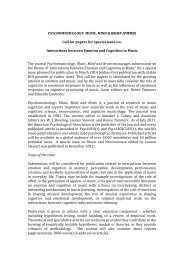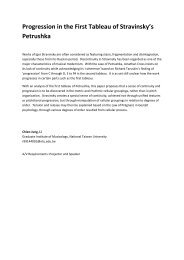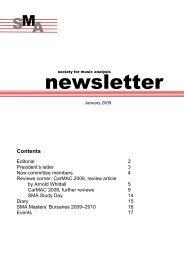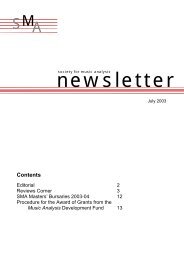Review - Society for Music Analysis
Review - Society for Music Analysis
Review - Society for Music Analysis
You also want an ePaper? Increase the reach of your titles
YUMPU automatically turns print PDFs into web optimized ePapers that Google loves.
disguises the substance of the analysis (or lack thereof). Although I was not able to<br />
take part in all of the discussions it was possible to keep abreast as each group<br />
nominated a spokesperson to report back to the entire audience. The ensuing<br />
exchange summed up many themes discussed during the conference, especially<br />
from the keynote. Issues included the ability to use technology in aiding the<br />
presentation of analysis, the plausibility of video analyses, their advantage in gaining<br />
a wider audience through the internet, and the receptiveness of students to the<br />
teaching of analysis. After an in<strong>for</strong>mative deliberation on each group’s conclusions,<br />
we turned our attention once more to new methods of disseminating analysis and<br />
discussed the intriguing possibility of a streaming service of music analysed by SMA<br />
members (any volunteers?). With this, another successful TAGS conference was<br />
brought to a close.<br />
18 th April, Professor Philip Tagg’s Keynote by Karishmeh Felfeli<br />
‘The Trouble with Tonal Terminology and the Symbiosis of Epistemic Inertia’<br />
Chair: Dr Nicholas Reyland<br />
Philip Tagg began his keynote by stating outright that he was not (as some<br />
may think) the enfant terrible of the musicological establishment, but rather someone<br />
who was simply interested in 'making life easy <strong>for</strong> Westerners not trained in classical<br />
music'. His opening comments reaffirmed the purpose and value of music analysis in<br />
an age of mass media: providing the means to trace acculturation across different<br />
demographic groups and to clarify genres that are too easily marginalised or<br />
mythologised—whose perception is at any rate distorted—through a lack of effective<br />
engagement with the materiality of the music. But most importantly, Tagg argued,<br />
verbal discourse about the non-verbal can help heal the fissures of dual<br />
consciousness. <strong>Music</strong> analysis provides us with the means to make sense of<br />
individual, emotive responses to music, which is why the musical object should<br />
always be sensitive to the cultural dynamics that contribute to its creation, use and<br />
perception. Tagg urged those working within the musicological establishment to<br />
reject a wholly auteur-like approach to their work in favour of one that respects the<br />
competence of music's users, by incorporating a substantial rather than nominal<br />
number of popular musics as objects of scrutiny both within analytical research and<br />
theory pedagogy.<br />
What followed was a deconstructive assault on the seemingly innocuous<br />
limitations of a euroclassically derived theoretical terminology described by the<br />
speaker as arcane, illogical and unnecessarily complex. By way of an example, here<br />
is a brief overview of the way in which Philip Tagg offered a simple rethinking of the<br />
terms 'tone', 'tonal' and 'tonality'. A 'tone', by definition is a note with audible<br />
fundamental pitch and periodic frequency, there<strong>for</strong>e the adjective 'tonal' should refer<br />
to music consisting of tones or characteristic of tones while the abstraction 'tonality'<br />
should refer to the system or nature of music being tonal. The term 'tonic', on the<br />
other hand, refers to a central reference tone in relation to which other tones in a<br />
piece of music are related. But, as Tagg pointed out, the distinction between 'tone'<br />
and 'tonic' does not exist in our music-theoretical terminology, a problem which is<br />
exemplified in the term 'atonal' which is often used to describe Schoenberg's music<br />
even though it is not devoid of tones as the term implies, but contains all twelve of<br />
them! Drawing from a simple linguistic paradigm, Tagg stated that the noun 'tonic'<br />
should yield the adjective tonical rather than 'tonal' in the same way as the noun<br />
cone yields the adjective conical and not conal. If we follow this way of thinking, then<br />
the tonal music of Mozart or Abba can be described as tonical, while works by







